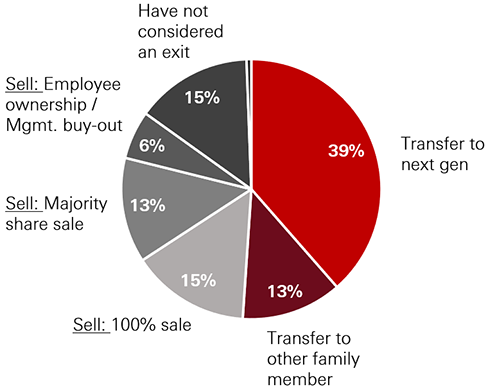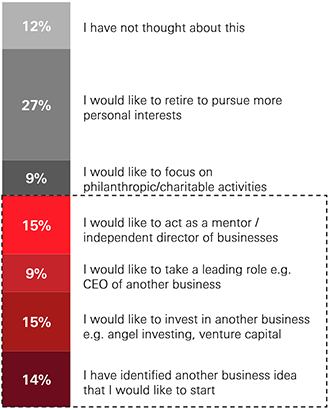This is a marketing communication issued by HSBC Private Bank. HSBC Private Bank is the principal private bank business of the HSBC Group. Private Bank may be carried out internationally by different HSBC legal entities according to local regulatory requirements. Different companies within HSBC Private Bank or the HSBC Group may provide the services listed in this document. Members of the HSBC Group may trade in products mentioned in this publication.
This document does not constitute independent investment research under the European Markets in Financial Instruments Directive (‘MiFID’), or other relevant law or regulation, and is not subject to any prohibition on dealing ahead of its distribution. Any references to specific financial instruments or issuers do not represent HSBC Private Bank’s views, opinions or recommendations, express or implied, and are provided for information only. The information contained within this document is intended for general circulation to HSBC Private Bank clients. The content of this document may not be suitable for your financial situation, investment experience and investment objectives, and HSBC Private Bank does not make any representation with respect to the suitability or appropriateness to you of any financial instrument or investment strategy presented in this document.
This document is for information purposes only and does not constitute and should not be construed as legal, tax or investment advice or a solicitation and/or recommendation of any kind from the Bank to you, nor as an offer or invitation from the Bank to you to subscribe to, purchase, redeem or sell any financial instruments, or to enter into any transaction with respect to such instruments.
HSBC Private Bank has based this document on information obtained from sources it believes to be reliable, but which may not have been independently verified. While this information has been prepared in good faith including information from sources believed to be reliable, no representation or warranty, expressed or implied, is or will be made by HSBC Private Bank or any part of the HSBC Group or by any of their respective officers, employees or agents as to or in relation to the accuracy or completeness of this document.
It is important to note that the capital value of, and income from, any investment may go down as well as up and you may not get back the original amount invested. Past performance is not a guide to future performance. Forward-looking statements, views and opinions expressed, and estimates given constitute HSBC Private Bank’s best judgement at the time of publication, are solely expressed as general commentary and do not constitute investment advice or a guarantee of returns and do not necessarily reflect the views and opinions of other market participants and are subject to change without notice. Actual results may differ materially from the forecasts/estimates.
Some HSBC Offices listed may act only as representatives of HSBC Private Bank and are therefore not permitted to sell products and services, or offer advice to customers. They serve as points of contact only. Further details are available on request.
In the United Kingdom, this document has been approved for distribution by HSBC UK Bank plc whose Private Bank office is located at 8 Cork Street, London W1S 3LJ and whose registered office is at 1 Centenary Square, Birmingham, B1 1HQ. HSBC UK Bank plc is registered in England under number 09928412. Clients should be aware that the rules and regulations made under the Financial Services and Markets Act 2000 for the protection of investors, including the protection of the Financial Services Compensation Scheme, do not apply to investment business undertaken with the non-UK offices of the HSBC Group. This publication is a Financial Promotion for the purposes of Section 21 of the Financial Services & Markets Act 2000 and has been approved for distribution in the United Kingdom in accordance with the Financial Promotion Rules by HSBC UK Bank plc, which is authorised by the Prudential Regulation Authority and regulated by the Financial Conduct Authority and the Prudential Regulation Authority.
In Guernsey, this material is distributed by HSBC Private Bank(C.I.), which is the trading name of HSBC Private Bank (Suisse) SA, Guernsey Branch, with registered office in Arnold House, St Julian's Avenue, St Peter Port, Guernsey, GY1 3NF. HSBC Private Bank (Suisse) SA, Guernsey Branch is licensed by the Guernsey Financial Services Commission for Banking, Credit, Insurance Intermediary and Investment Business. HSBC Private Bank (Suisse) SA is registered in Switzerland under UID number CHE-101.727.921, with registered office in Quai des Bergues 9-17, 1201 Geneva (GE), Switzerland. HSBC Private Bank (Suisse) SA is licensed as a Bank and Securities Dealer by the Swiss Financial Market Supervisory Authority FINMA.
In Jersey, this material is issued by HSBC Bank plc, Jersey Branch, HSBC House, Esplanade, St. Helier, Jersey, JE1 1HS. HSBC Bank plc, Jersey Branch is regulated by the Jersey Financial Services Commission. HSBC Bank plc is registered in England and Wales, number 14259. Registered office 8 Canada Square, London, E14 5HQ. HSBC Bank plc is authorised by the Prudential Regulation Authority and regulated by the Financial Conduct Authority and the Prudential Regulation Authority.
In Isle of Man, this material is issued by HSBC Bank PLC, Clinch’s Suite 2.4, Lord Street, Douglas IM1 4LN.. HSBC Bank plc is licensed and regulated by the Isle of Man Financial Services Authority. HSBC Bank plc is registered in England and Wales, number 14259. Registered office 8 Canada Square, London, E14 5HQ. HSBC Bank plc is authorised by the Prudential Regulation Authority and regulated by the Financial Conduct Authority and the Prudential Regulation Authority.
In France, this material is distributed by HSBC Private Bank Luxembourg French Branch - SIREN 911 971 083 RCS Paris. HSBC Private Bank in France is subject to approval and control by the Autorité de Contrôle Prudentiel et de Résolution [Prudential Control and Resolution Authority]. HSBC Private Bank is a Branch of HSBC Private Bank (Luxembourg) S.A. 18 Boulevard de Kockelscheuer L-1821 Luxembourg, Public Limited Luxembourg Company with share capital of : 160.000.000 euros, RCS Luxembourg : B52461, Trade and Companies Register of Paris Bank and Insurance Intermediary registered with the Organisme pour le Registre des Intermédiaires en Assurances [Organisation for the Register of Insurance Intermediaries] under no. 2011CM008 (www.orias.fr) - Intra-community VAT number: FR34911971083. HSBC Private Bank in France - Registered office: 38, avenue Kléber 75116 Paris- FRANCE
In or from Switzerland, this marketing material is distributed by HSBC Private Bank (Suisse) SA, a bank regulated by the Swiss Financial Market Supervisory Authority FINMA, whose office is located at Quai des Bergues 9-17, 1201 Geneva, Switzerland. This document does not constitute independent financial research and has not been prepared in accordance with the Swiss Bankers Association’s “Directive on the Independence of Financial Research”, or any other relevant body of law.
In Abu Dhabi Global Markets (ADGM), this material is distributed by, HSBC Bank Middle East Limited, ADGM Branch, Al Sila Tower, The Executive Centre, Level 12, PO BOX 764648, Abu Dhabi, which is regulated by the ADGM Financial Services Regulatory Authority (FSRA) and lead regulated by the Dubai Financial Services Authority (DFSA). Contents in this document are directed at FSRA defined Professional Clients and only a Person meeting this criteria should act upon it.
In Dubai International Financial Centre (DIFC), this material is distributed by HSBC Private Bank (Suisse) SA, DIFC Branch, P.O. Box 506553 Dubai, UAE which is regulated by the Dubai Financial Services Authority (DFSA) and Swiss Financial Market Supervisory Authority FINMA. Contents in this document are directed at DFSA defined Professional Clients and only a Person meeting this criteria should act upon it.
In South Africa, this material is distributed by HSBC Private Bank (Suisse) SA, South Africa Representative Office approved by the South African Reserve Board (SARB) under registration no. 00252 and authorized as a financial services provider (FSP) for the provision of Advice and Intermediary Services by the Financial Sector Conduct Authority of South Africa (FSCA) under registration no. 49434. The Representative Office has its registered address at 2 Exchange Square, 85 Maude Street, Sandown, Sandton.
In Bahrain, this communication is distributed by HSBC Bank Middle East Limited, Bahrain Branch, a member of the HSBC Group, which comprises HSBC Holdings Plc and each of its subsidiaries and includes entities providing private bank services. HSBC Bank Middle East Limited, Bahrain Branch may refer clients to HSBC Group entities providing private bank services as well as, to the extent permissible, refer certain private bank financial products and services to clients in Bahrain. However, such private bank financial products and services shall be governed by the terms and conditions and laws and regulations applicable to relevant HSBC Group entity that will provide the financial products or services.
HSBC Bank Middle East Limited, Bahrain Branch, is regulated by the Central Bank of Bahrain and is lead regulated by the Dubai Financial Services Authority.
In Qatar, this communication is distributed by HSBC Bank Middle East Limited, Qatar Branch, P.O. Box 57, Doha, Qatar, which is licensed and regulated by the Qatar Central Bank and is lead regulated by the Dubai Financial Services Authority.
HSBC Bank Middle East Limited, Qatar Branch may refer clients to HSBC Group entities providing private bank services as well as, to the extent permissible, refer certain private bank financial products and services to clients in Qatar. However, such private bank financial products and services shall be governed by the terms and conditions and laws and regulations applicable to relevant HSBC Group entity that will provide the financial products or services.
In Lebanon, this material is distributed by HSBC Financial Services (Lebanon) S.A.L. (“HFLB”), licensed by the Capital Markets Authority as a financial intermediation company Sub N°12/8/18 to carry out Advising and Arranging activities, having its registered address at Centre Ville 1341 Building, 4th floor, Patriarche Howayek Street, Beirut, Lebanon, P.O. Box Riad El Solh 9597.
In Hong Kong and Singapore, THE CONTENTS OF THIS DOCUMENT HAVE NOT BEEN REVIEWED OR ENDORSED BY ANY REGULATORY AUTHORITY IN HONG KONG OR SINGAPORE. HSBC Private Bank is a division of Hongkong and Shanghai Bank Corporation Limited. In Hong Kong, this document has been distributed by The Hongkong and Shanghai Bank Corporation Limited in the conduct of its Hong Kong regulated business. In Singapore, the document is distributed by the Singapore Branch of The Hongkong and Shanghai Bank Corporation Limited. Both Hongkong and Shanghai Bank Corporation Limited and Singapore Branch of Hongkong and Shanghai Bank Corporation Limited are part of the HSBC Group. This document is not intended for and must not be distributed to retail investors in Hong Kong and Singapore. The recipient(s) should qualify as professional investor(s) as defined under the Securities and Futures Ordinance in Hong Kong or accredited investor(s) or institutional investor(s) or other relevant person(s) as defined under the Securities and Futures Act in Singapore. Please contact a representative of The Hong Kong and Shanghai Bank Corporation Limited or the Singapore Branch of The Hong Kong and Shanghai Bank Corporation Limited respectively in respect of any matters arising from, or in connection with this report.
In Thailand, this material is distributed by The Hongkong and Shanghai Bank Corporation Limited, Bangkok branch. Registered and incorporated in Hong Kong SAR. Registered office: 1 Queen’s Road Central, Hong Kong SAR and registered as a branch office in Thailand having registered number: 0100544000390. Bangkok branch registered office: No. 968 Rama IV Road, Si Lom Sub-district, Bang Rak District, Bangkok Metropolis. Authorized and supervised by the Bank of Thailand and the Securities and Exchange Commission, Thailand.
In Luxembourg, this material is distributed by HSBC Private Bank (Luxembourg) S.A RCS B52461, which is located at 18 Boulevard de Kockelscheuer L-1821 Luxembourg and is regulated by the Commission de Surveillance du Secteur Financier (“CSSF”).
In the United States, “HSBC Private Banking” is the marketing name for the private bank business. HSBC Private Bank offers bank products and services through HSBC Bank USA, N.A. ("HSBC Bank"), Member FDIC. Investment, annuities, and variable life insurance products are offered by HSBC Securities (USA) Inc. ("HSBC Securities"), member NYSE/FINRA/SIPC. In California, HSBC Securities conducts insurance business as HSBC Securities Insurance Services. License #: OE67746. HSBC Securities is an affiliate of HSBC Bank. Whole life, universal life, term life, and other types of insurance are offered by HSBC Insurance Agency (USA) Inc., a wholly owned subsidiary of HSBC Bank. Products and services may vary by state and are not available in all states. California license #: OD36843.
Investments, Annuity and Insurance Products: Are not a deposit or other obligation of the bank or any of its affiliates; Not FDIC insured or insured by any federal government agency; Not guaranteed by the bank or any of its affiliates; and may lose value
All decisions regarding the tax implications of your investment(s) should be made in consultation with your independent tax advisor
In Australia, this document is issued by HSBC Bank Australia Limited ABN 48 006 434 162, AFSL/ACL 232595 (HBAU). It is prepared by The Hongkong and Shanghai Bank Corporation Limited (HBAP), 1 Queen’s Road Central, Hong Kong. HBAP is incorporated in Hong Kong and is part of the HSBC Group. HBAP has a Sydney Branch ARBN 117 925 970 AFSL 301737. The document is current and is subject to change at any time.
The statements contained in this document is general in nature and does not constitute investment research or a recommendation, or a statement of opinion (financial product advice) to buy or sell investments. This document has not taken into account your personal objectives, financial situation and needs. Because of that, before acting on the document you should consider its appropriateness to you, having regard to your objectives, financial situation or needs.
This document is not by any means intended as a solicitation, nor a recommendation to purchase financial products in any jurisdiction in which such an offer is not lawful.
Some of the statements contained in this document may be considered forward looking statements which provide current expectations or forecasts of future events. Such forward looking statements are not guarantees of future performance or events and involve risks and uncertainties. Actual results may differ materially from those described in such forward-looking statements. HBAU, HBAP and the HSBC Group of companies do not give any warranty or make any representation as to the accuracy or completeness of the forward-looking statements contained herein, or as to changes in the statements after the publication.
The value of investments and the income from them can go down as well as up and investors may not get back the amount originally invested. Past performance contained in this document or video is not a reliable indicator of future performance whilst any forecasts, projections and simulations contained herein should not be relied upon as an indication of future results.
Investments in emerging markets are by their nature higher risk and potentially more volatile than those inherent in some established markets. Economies in emerging markets generally are heavily dependent upon international trade and, accordingly, have been and may continue to be affected adversely by trade barriers, exchange controls, managed adjustments in relative currency values and other protectionist measures imposed or negotiated by the countries with which they trade. These economies also have been and may continue to be affected adversely by economic conditions in the countries in which they trade. Investments are subject to market risks, read all investment related documents carefully.
HBAU, HBAP and the HSBC Group of companies accepts no responsibility for the accuracy and/or completeness of any third-party information obtained from sources we believe to be reliable but which have not been independently verified.
© Copyright 2025. The Hongkong and Shanghai Bank Corporation Limited, ALL RIGHTS RESERVED.
No part of this document may be reproduced, stored in a retrieval system, or transmitted, on any form or by any means, electronic, mechanical, photocopying, recording or otherwise, without the prior written permission of The Hongkong and Shanghai Bank Corporation Limited.
In mainland China, this material is distributed by HSBC Bank (China) Company Limited (“HBCN”) to its customers for general reference only. This document has no contractual value and is not and should not be construed as an offer or the solicitation of an offer or a recommendation for the purchase or sale of any investment or subscribe for, or to participate in, any services. HBCN is not recommending or soliciting any action based on it.
In UAE, this material is distributed by HSBC Bank Middle East Limited UAE Branch, which is regulated by the Central Bank of UAE, the Securities and Commodities Authority in the UAE under license number 602004 and for the purpose of this promotion and lead regulated by the Dubai Financial Services Authority.
In Kuwait, this material is distributed by HSBC Bank Middle East Limited, Kuwait Branch (HBME KUWAIT) which is regulated by the Central Bank of Kuwait, Capital Markets Authority for licensed Securities Activities and lead regulated by the Dubai Financial Services Authority. This document is directed to clients of HBME KUWAIT and should not be acted upon by any other person. HBME KUWAIT is not responsible for any loss, damage or other consequences of any kind that you may incur or suffer arising from or relating to your use of or reliance on this document. The content of this document does not constitute the offering of advice or recommendation to invest and should not be used as the basis for any decision to buy or sell investments.
In HSBC India, this material is distributed by Hongkong and Shanghai Bank Corporation Limited, India (“HSBC India”). HSBC India is a branch of the Hongkong and Shanghai Bank Corporation Limited. HSBC India is an AMFI-registered Mutual Fund Distributor of select mutual funds and a referrer of other 3rd party investment products. Mutual Fund investments are subject to market risks, read all scheme related documents carefully. HSBC India does not distribute investment products to those persons who are either the citizens or residents of United States of America (USA), Canada or any other jurisdiction where such distribution would be contrary to law or regulation. HSBC India, will receive commission from HSBC Asset Management (India) Private Limited, in its capacity as a AMFI registered mutual fund distributor of HSBC Mutual Fund. The Sponsor of HSBC Mutual Fund is HSBC Securities and Capital Markets (India) Private Limited (HSCI), a member of the HSBC Group. Please note that HSBC India and the Sponsor being part of the HSBC Group, may give rise to real, perceived, or potential conflicts of interest. HSBC India has a policy in place to identify, prevent and manage such conflict of interest. HSBC India provides non-discretionary portfolio advisory services for select Private Bank customers under the SEBI (Portfolio Managers) Regulations, 2020 (“PMS Regulations”) vide registration no. INP000000795. Performance of each portfolio may vary for each investor because of 1) the timing of inflows and outflows of funds; and 2) differences in the portfolio composition because of restrictions and other constraints.
For SAA/TAA
This is an illustrative approach of a globally diversified portfolio allocation strategy across asset classes; the strategy and the underlying fulfilment options are not applicable to India customers.
Where your location of residence differs from that of the HSBC entity where your account is held, please go to HSBC Private Bank website > Disclaimer > Cross Border Disclaimer for disclosure of cross-border considerations regarding your location of residence.
No part of this publication may be reproduced, stored in a retrieval system, or transmitted, on any form or by any means, electronic, mechanical, photocopying, recording or otherwise, without the prior written permission of HSBC.
A complete list of private bank entities is available on our HSBC Private Bank website.
©Copyright HSBC 2025
ALL RIGHTS RESERVED


/images-2023/HSBC%20Global%20Private%20Banking%20-%20Office%20Window.jpg/_jcr_content/renditions/cq5dam.web.1280.1280.jpeg)
/images-2023/HSBC%20Global%20Private%20Banking%20-%20Cityscape%20image%20of%20Mumbai.jpg/_jcr_content/renditions/cq5dam.web.1280.1280.jpeg)


/banner-2023/HSBC%20Global%20Private%20Banking%20-%20Balkan%20Mountains,%20Bulgaria.jpg)







